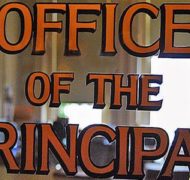The Evaluation: In the Principal’s Office
Blog / Produced by The High Calling
"I'll be perfectly honest with you," he says, as he twists his university class ring. "You won't be an effective teacher."
Then comes the deep snort and pinching of the nose.
So I gird my spine with steel. Because I’m sitting in the principal’s office. And it feels like a bloody altar, where all the big, final decisions are made.
"No, I always tell my new teachers that they're not going to be effective for three to five years. At least."
These last words waft across his desk. Slow like smoke.
"Before I got your résumé, I recommended two other candidates to the school superintendent," he continues. "But she turned them both down."
At first, I had been thankful to learn this position remained open, allowing me a last-minute opportunity to submit my résumé. But now I wondered about a potential disconnect between these two leaders about what constitutes an effective teacher. Were they looking for different qualities? If so, would I be destined to disappoint someone?
Eventually, my spine relaxed, but not until I had cleared the final interview with the superintendent and accepted the high school teaching position. Even then, my career anxieties didn't disappear. They hung around like a smoky haze, thickening in the face of looming yearly evaluations and contract renewals. My visits to the altar where far from over.
Like any new teacher, I began with a provisional license, which terrorized me with probationary status for two years, so I worked hard to manifest my "effectiveness" ahead of schedule. I knew the administration would be watching.
But I rarely saw them.
I had a scattering of observations and evaluations during my first two years. My principal generally allowed me to choose the timing of his classroom visits, but I still reached for a red tie on the morning of the first observation. If a red tie could exude power and confidence, then perhaps a good Windsor knot could help me out in the effectiveness department, too.
I hoped so, because he was late. I had to reconfigure the sequence of my highly choreographed classroom routine on the fly, to ensure he wouldn't miss any highlights. Still, my 45-minute performance to demonstrate proficiency and effectiveness continued to shrink—until the sudden stirring of a weighty key ring shook the room. Even my students vibrated.
He sat in an empty desk and made notes. Why did he appear more apathetic than any of my students? And why did he leave before class ended?
Several days later, I received the evaluation in my office mailbox. With a yellow Post-it note attached.
Mr. Kreider, Come see me (at the altar).
He motioned for me to take a seat while he finished a call. I watched the old words waft across his desk.
Thankfully, I received an excellent evaluation. I even got high marks in professional attire. He did suggest I make better use of my bulletin boards, however. He directed me to another teacher who had achieved an exemplary use of space. I redesigned my bulletin boards right away.
Call it a success, but it still somehow felt as if I had gone to the temple for an annual checkup and the high priest merely smiled from his chair and recommended I straighten my tie.
Over time, the observations and feedback slowed down and, in the absence of communication, I often worried if I was losing a shade of visibility.
But what haunted me most, on a daily basis, was the unresolved question of my effectiveness. As standardized testing and school accountability became hot political issues, my personal measure of effectiveness felt more vulnerable to a changing evaluation model. Even if legislators were still struggling to define it, many educators, including myself, were already beginning to worship it.
I loathed the long walk down to the office each year to look over the newly-released state exam scores for my students, even though they were usually well-above the state average.
The office is where people with problems go.
But the highest performance evaluation in the world won’t give us the peace of mind we’re looking for—when we allow contractual agreements to become a religion. Though they offer a measure of control and peace of mind, they're generally cold and impersonal. We need something stronger than a set of terms and conditions spelled out in heavy stone tablets.
In Genesis 15, Abram was anxious about his outlook too. He was about to sign a contract with God. As per custom, he expected to be asked to walk through the severed carcasses, effectively vowing, "May I also become like these torn animals if I don't fulfill my terms and conditions, Lord."
But God never asked him to sign that contract, despite all the smoke and anxiety.
" ... behold, there appeared a smoking oven and a flaming torch which passed between these pieces." (Genesis 15:17 NASB)
To demonstrate his commitment, God walked through on our behalf, promising he himself would come under the sword and be torn apart in order to guarantee a spotless evaluation for us.
Even then, God knew we'd never be truly effective in any area of our life without some help.
______________________________
The Evaluation
Each year, workers everywhere receive an evaluation of their job performance from their employer and, while most evaluations in the workplace don't go quite the way they appear on some television shows, those annual evaluations are often the source of everything from disappointment and stress, to surprise and a boost of confidence. How do we approach and receive evaluations as Christian workers? What can we learn from Jesus about giving and receiving words of instruction, correction, and affirmation? How can entrepreneurs and the self-employed remain accountable for doing good work and for keeping an eye on weaknesses and vulnerabilities in the workplace? Our series, The Evaluation, takes a closer look.
Featured image by Eric E. Castro. Used with Permission. Source via Flickr.










